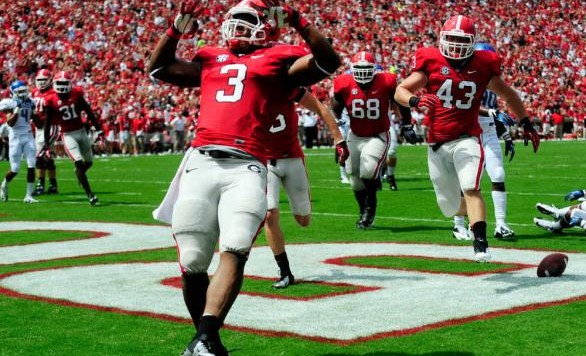In the wake of Todd Gurley’s suspension last week for allegedly signing autographs for cash, members of SB Nation’s editorial team revealed that they passed on the story when approached multiple times by a bottom-feeding memorabilia dealer offering to dime out Georgia’s star running back. In doing so, writers Spencer Hall and Steven Godfrey gave a unique explanation for the decision, at least within the strictures of traditional journalism:
“After verifying a.) the tipster’s identity, and b.) that this person has sold Gurley-autographed gear on eBay under the name provided, we let it drop, because the purpose of this website is not to enforce the NCAA’s insane bylaws. On the contrary, we’re all for players making money, and are thus editorially supportive of those bylaws’ erosion.”
SB Nation’s stance on the matter is already being dissected by the usual media watchdogs, including Deadspin and Student Section sister site Awful Announcing. I’ll leave it to them to hash out if a great crime against journalism was committed by not reporting the story. As someone who’s philosophically sympathetic to their position on the underlying matter of NCAA bylaws, I’m more interested in the part about being “editorially supportive of those bylaws’ erosion.”
It’s not exactly a secret that the NCAA is totally shorthanded in its ad hoc regulation of the labor force in major college athletics today. Note that every time a Todd Gurley or a Johnny Manziel gets caught up in a memorabilia imbroglio, you can find circumstantial evidence pointing to similar violations by other star players. Given how easy it is to skirt the rules and avoid detection, it comes as no surprise that cheating is rampant.
In that respect, the media does enable–if not mandate–the selective enforcement of these rules by reporting on allegations the NCAA has neither the resources nor the time to proactively police.
Yet, the reality is that the NCAA’s member institutions have thrived in a shadowy world. Like willfully ignorant spouses who look the other way while their partners are cheating, everything is cool so long as no one gets caught. In exchange for token nods to compliance, schools get to hoard way more than their fair share of the booty. Athletes have a number of illicit avenues to cash in on their status, from boosters to agents to swag. They only get in trouble if they get sloppy.
Eventually, a Gurley or a Terrelle Pryor is going to get sacrificed to the amateurism gods to keep everything running smoothly. Given how I feel on the matter, I can’t really fault SB Nation for declining to be the one to make that offering.
But here’s where that “sunshine-is-the-best-disinfectant” thing comes in.
The proliferation of media beyond the traditional outlets has given the public a more robust picture of the behind-the-scenes world of major college football. (SB Nation’s Godfey has done some landmark work in this regard.) More is being done now than ever before to vet schools’ claims to athletics as part of the academic enterprise and not a billion-dollar industry. We’re being exposed to ways in which schools tacitly endorse college football’s shadow economy.
Equally importantly, the “scandal” tinge to stories like those of Gurley seems to be fading.
As we learn that college athletics have even bigger fish to fry, more people appear to be asking why we’re bothering with mini-helmets getting signed for five bucks a pop. Unfortunately for now, I don’t know how that process of creative destruction can avoid enabling the NCAA and giving mouth-breathers the ammo to demonize a guy like Gurley.
I really like the sentiment behind media members refusing to carry the NCAA’s water. I hope more people follow that example and consider the roles that they play in supporting such power structures. But when it comes to the larger goal of beneficial reform in major college athletics, I’d hate to see that turn into a retreat from promoting transparency.

